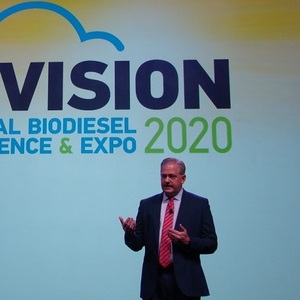New US biodiesel industry vision lays out 2030, 2050 use targets

Photo: Ron Kotrba, Biodiesel Magazine
January 21, 2020
BY The National Biodiesel Board
The biodiesel industry has come together Jan. 20-23 to focus its sights on learning, networking and doing business during the National Biodiesel Conference & Expo. The national event of the year kicked off in Tampa with motivating remarks from industry leadership.
To lead off the conference, all eyes were on National Biodiesel Board CEO Donnell Rehagen as the organization’s new public vision statement highlighted his state of the industry remarks to attendees. The new NBB vision reads:
Biodiesel, renewable diesel and renewable jet fuel will be recognized as mainstream low-carbon fuel options with superior performance and emission characteristics. In on-road, off-road, air transportation, electricity generation and home heating applications, use will exceed 6 billion gallons by 2030, eliminating more than 35 million metric tons of CO2 equivalent greenhouse gas emissions annually. With advancements in feedstock, use will reach 15 billion gallons by 2050.
Advertisement
Advertisement
“Without a clear vision of the future—what we want to be, where we want to go and how we’ll get there—we’ll never be more than we are today,” Rehagen said. “As carbon policies around the country really begin to take hold, we see low-carbon fuels like biodiesel, renewable diesel and renewable jet fuel with a tremendous opportunity for growth. While the volumes in our new industry vision may seem ambitious, there is a very clear path to meeting this vision as long as we stay committed to working together and continuing to collaborate. Ambitious industries need ambitious goals. And, in our case, our country needs us to be this ambitious.”
The association’s plan recognizes there is no logical path to zero carbon without growing volumes of low-carbon transportation fuels like biodiesel and renewable diesel.
“I truly believe we are on the cutting edge of a fundamental shift in how consumers look at their fuel for transportation and home heating,” Rehagen said. “Just look at some of our largest markets. Consumers there are already paying for the value of low-carbon fuels. Biodiesel is a premium product and it must be produced, bought and sold that way.”
Advertisement
Advertisement
Rehagen also showcased a new tagline to go with the long-used biodiesel logo that emphasizes the benefits of the fuel in a succinct way—Better. Cleaner. Now! This tag line will be a center point of NBB’s education and promotion activities moving forward, aiming to drive the narrative about the myriad of ways that biodiesel and renewable diesel are a better choice for consumers, policy makers and the environment.
The opening ceremony also included a look at the industry’s continuous efforts in federal policy, including major challenges and some significant wins in 2019. The crowning achievement last year was the reinstatement of the biodiesel tax credit that provided much-needed retroactivity for 2018 and 2019 and a forward-looking credit through 2022. Three years forward is the longest time period the industry has been able to count on the credit since it was first introduced in 2005. Now the association will turn collective attention to the No. 1 industry driver—the Renewable Fuel Standard.
“Our job is not an easy one with an EPA that has taken every opportunity it has to hold growth of renewable fuels down,” Rehagen said. “2020 will see us aggressively claim our space in the RFS and advocate at all levels of government for the recognition that significant growth of biomass-based diesel in the RFS is not just warranted and earned by our industry but is good federal policy in an environment of carbon reduction.”
The NBB hosts this annual must-attend event to facilitate business, education and networking. The National Biodiesel Conference & Expo is put on with the generous support of industry sponsors. Made from an increasingly diverse mix of resources such as recycled cooking oil, soybean oil and animal fats, biodiesel is a renewable, clean-burning diesel replacement that can be used in existing diesel engines without modification. It is the nation’s first domestically produced, commercially available advanced biofuel. NBB is the U.S. trade association representing the entire biodiesel and renewable diesel value chain, including producers, feedstock suppliers and fuel distributors.
Related Stories
The USDA has announced it will delay opening the first quarterly grant application window for FY 2026 REAP funding. The agency cited both an application backlog and the need to disincentivize solar projects as reasons for the delay.
CoBank’s latest quarterly research report, released July 10, highlights current uncertainty around the implementation of three biofuel policies, RFS RVOs, small refinery exemptions (SREs) and the 45Z clean fuels production tax credit.
The U.S. EPA on July 8 hosted virtual public hearing to gather input on the agency’s recently released proposed rule to set 2026 and 2027 RFS RVOs. Members of the biofuel industry were among those to offer testimony during the event.
The USDA’s Risk Management Agency is implementing multiple changes to the Camelina pilot insurance program for the 2026 and succeeding crop years. The changes will expand coverage options and provide greater flexibility for producers.
President Trump on July 4 signed the “One Big Beautiful Bill Act.” The legislation extends and updates the 45Z credit and revives a tax credit benefiting small biodiesel producers but repeals several other bioenergy-related tax incentives.
Upcoming Events










